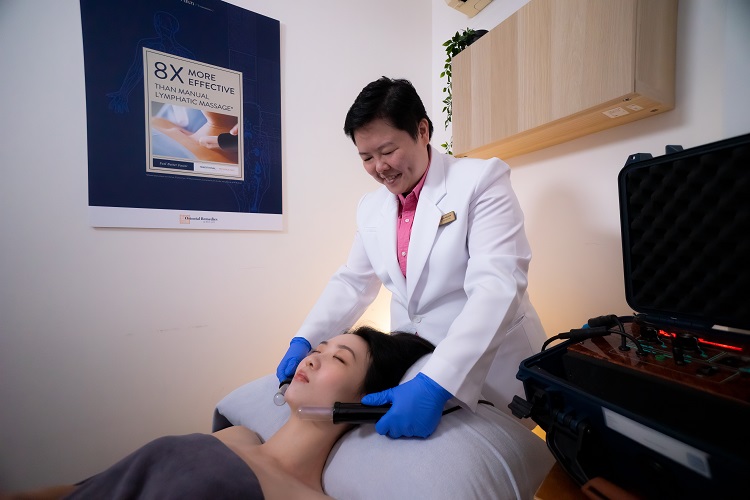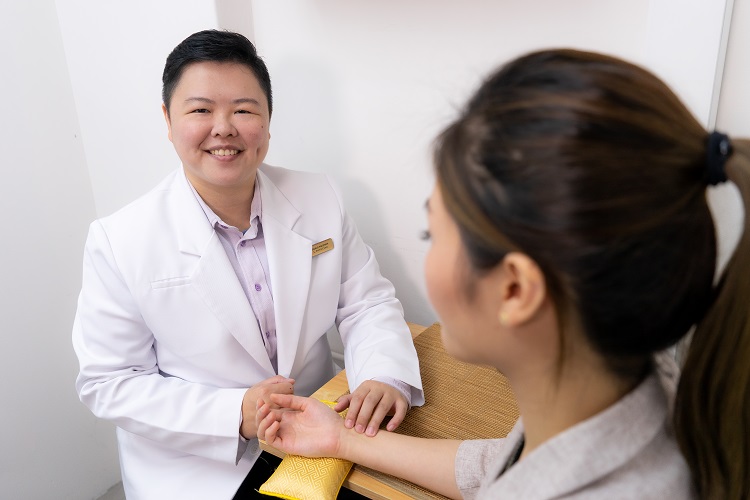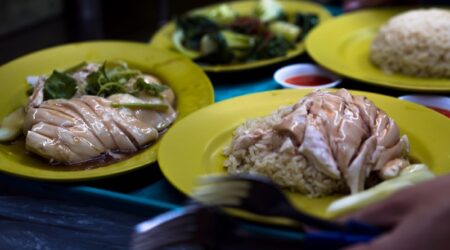Can TCM help relieve anxiety, stress & depression?
We often associate Traditional Chinese Medicine (TCM) with holistic treatments that target physical ailments. But TCM practitioners also believe that mental and physical wellness are closely linked, and TCM treatments can in fact help alleviate mental disorders.
“Disruptions to mental health occur when vital organs such as the heart and liver are out of balance. Signs of this typically include anxiety, disrupted sleep, and frequent mood swings, which point to the need to address the underlying root cause of one’s chronic mental health concerns,” shares TCM physician Leong Weizhen, 35, who is the CEO of Oriental Remedies Group.
“Overall, the organs that are closely related to mental health are the heart, liver, and spleen (in TCM terms, not conventional organs).”
Trained in both TCM and Biomedical Sciences, her passion for TCM stems from the creativity needed in treating patients. “In TCM, with any given body constitution, there are many creative ways to combine herbal medications to help patients feel better faster,” she tells us. “This flexibility and creativity and a lifetime of improving my medical knowledge to help patients is something I enjoy.
She shares more nuggets on how TCM can be used to mitigate mental disorders including postpartum depression, the types of treatments available, common misconceptions, and more.
How are chronic physical conditions linked to mental health concerns like anxiety, depression, and insomnia?
Leong Weizhen (LW): Some patients with chronic conditions like eczema, cancer, rheumatoid arthritis, and fibromyalgia also experience mental health conditions like anxiety, depression, and insomnia. For some, the debilitating effects of their condition have impacted their quality of life and mental condition.
Some cancer patients have shared that they become depressed from endless treatments, and repetitive tests. Certain chronic conditions like arthritis, fibromyalgia, Sjogren’s syndrome, and chronic neck and back pain may not be life-threatening but can bring about anxiety and depressive moods.
Eczema, for instance, can cause constant itching and sleepless nights. Certain patients may stop work or social interactions, which can result in anxiety.
These diseases require long-term patient care, constant self-awareness of their lifestyle and it can take a toll on their mental well-being.
How do you observe these symptoms in your patients?
LW: We can see it through the pulse of the patient. For instance, patients with anxiety tend to have a thin wiry pulse (especially on their left hand), which reflects stress and tension.
Symptoms can also be spotted through the tongue. We tend to see a red tip on the tongue or even a clear red margin on the side of the tongue which indicates both heart and liver ‘fire’.
Patients who suffer from depression may not only have a thin pulse, but also an abnormality in the pulse that causes its surface to become slightly concaved or depressed in the right hand. It is opposite from the heat elements that we see in patients with anxiety. For them, their tongue may be presented with a greasy coating and thus we need to strengthen their spleen and digestive function.
How does Oriental Remedies’ technology-enhanced TCM treatments help in improving mental health?

LW: We use technology to complement traditional TCM treatment. This helps patients achieve health in a faster and more efficient way, as well as ensures all aspects of their mental health can be taken care of.
The two main therapies we use are the FDA-registered Electro Lymphatic Therapy (ELT) and Negative Ion Therapy.
ELT promotes lymphatic drainage and clears inflammatory cells away from congested parts of the body. An excess of inflammatory cells and congestion in the lymphatic system can increase the risk of infections and psychiatric concerns.
A healthy lymphatic system is vital to the body’s immune system, which has been increasingly associated with mental health. People with higher rates of inflammation are likelier to show signs of depression.
Negative ion therapy can help alleviate mood disorders by supplying the body with negative ions. This boosts cell metabolism to help remove metabolic waste caused by brain activity. An accumulation of such waste increases the risk of neurological diseases and a decrease in brain health.
When treating patients with mental health issues, TCM herbs and acupuncture can help correct underlying imbalances and soothe the mind.
Could you tell us about an instance whereby TCM has helped a patient with their mental health?
LW: As the pandemic rages on, we have encountered more patients with mental health issues. Most, if not all, have benefitted immensely from TCM treatment. For instance, we had a patient in her fifties who was suffering from anxiety and depression at the same time, as well as serious mood swings that affected her sleep and appetite.
After taking TCM herbs over the course of two months, her anxiety and depression improved considerably and she no longer experienced serious mood swings.
During clinic visits, her anxious and alert demeanor had also changed to one that was more relaxed and at ease. She visits the clinic every two to three weeks even now for general wellness as she believes that TCM treatment has helped her tremendously.
What’s the process and treatment like?

LW: As TCM adopts a holistic treatment approach, we focus not only on the disease but also on the patient’s general condition and lifestyle.
We have an in-depth consultation to understand the patients’ medical history and lifestyle habits, diet, and work-related stress, go through pulse-taking and tongue inspection, and also observe their body language e.g. tell-tale signs of anxiety such as fingernails picking, excessive leg shaking or stuttering.
Depending on their constitution and underlying TCM imbalances, we will customise the most suitable treatment, and the clinic will assist in securing appointment slots for consistent treatment.
What are the myths and misconceptions when it comes to mental health aid through TCM?
Myth: TCM treatment’s effects on mental health are placebo and/or psychological
Fact: Various research and studies have proven that TCM treatment is effective in alleviating mental health conditions.
Some show that acupuncture can help our brain release endorphins, which are natural painkillers produced by our bodies. In fact, it’s been scientifically proven and recognised by the World Health Organisation (WHO) to be an effective treatment for a number of disorders.
Myth: TCM can only treat mental health disorders through acupuncture
Fact: While it’s true that acupuncture is effective, other treatments like TCM herbs are equally effective and might even be necessary for mental health patients. Cupping and scraping treatments are also useful in relaxing tense muscles, relieving tension, and helping to improve sleep quality.
Myth: If I go through TCM treatment, I do not have to take Western medication
Fact: Some patients with mild mental health disorders may not require Western medicines, but those with severe conditions have to do so even while seeking TCM treatment. TCM requires consistent treatment and time for recovery and can be a complementary treatment. Western medicine is required to manage symptoms during this period.
Myth: It takes a long time to help mental wellness with TCM
Fact: It may take a few months for a patient’s symptoms to reduce significantly and go into the maintenance phase, but most see improvements in the first few weeks of treatment.
Some have experienced calmer moods and better sleep after just one session of acupuncture. Recovery time and speed vary among individuals, but positive lifestyle changes and consistent TCM treatment have been shown to greatly speed up improvements in mental wellness.
Are there any limitations to using TCM for mental wellness? What conditions are not suitable for TCM treatment?
LW: TCM can help to manage symptoms of mental health issues, but it is not a cure. To prevent a condition from relapsing or worsening, patients still have to learn to manage their stress levels and create a lifestyle environment that is beneficial to their mental health.
Even after symptoms have greatly improved, they are still encouraged to have follow-up sessions with physicians for upkeep and general wellness.
However, if the patient’s condition is more severe such as with suicidal thoughts or split personalities, we have relevant medical professionals that we refer patients to, and encourage them to keep TCM as the complementary treatment.
Apart from ELT, what other methods does the clinic use to treat patients with mental health concerns?
LW: Other methods include acupuncture, herbs, cupping and scrapping, moxibustion and negative ion therapy.
Acupuncture is another effective way of reducing liver ‘qi’ (energy flow in the body) stagnation, which is a common deficiency linked to mental wellness in TCM. Common acupoints are stimulated to soothe the mind and improve the flow of liver ‘qi’.
TCM herbs can help to improve emotional health and reduce stress by regulating liver ‘qi’. When there is emotional stress involved, we usually say that the liver ‘qi’ is stagnant. Herbs can help improve ‘qi’ circulation as well as correct body ‘qi’ imbalances to help alleviate the mood.
TCM has been used to treat women with postpartum and menopause depressive symptoms. Have you had any patients with these conditions?
LW: Yes, many women face mood issues during postpartum and menopause due to hormonal changes. Our clinic uses a variety of methods to help these conditions.
For new mothers, postpartum stress, if left untreated, can lead to depression. Many avoid using antidepressants as they worry about the potential side effects. So most of our postpartum patients with depressive symptoms opt for a safer approach with herbal medication and acupuncture.
After giving birth, their bodies experience deficiencies, which fail to nourish their heart and spleen, leading to poor decision-making (in TCM, heart organs control the cognitive function and decision-making process). We use a combination of herbs to aid their digestive functions, as well as acupuncture to improve both their body condition and mental wellness.
For patients with menopause depressive symptoms, herbs and acupunture can help them to recover, but the prescription will be different. ELT and Negative Ion Therapy is also used to help lower inflammation and promote better brain health.












Leave a Reply